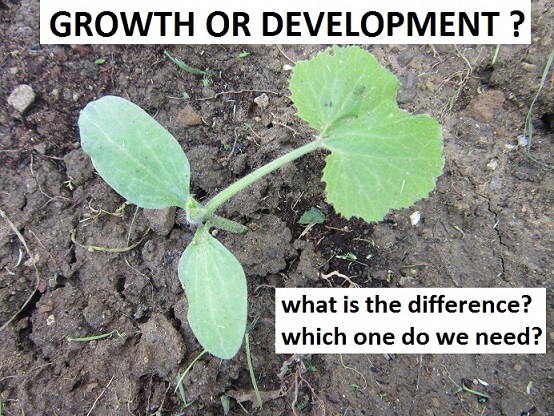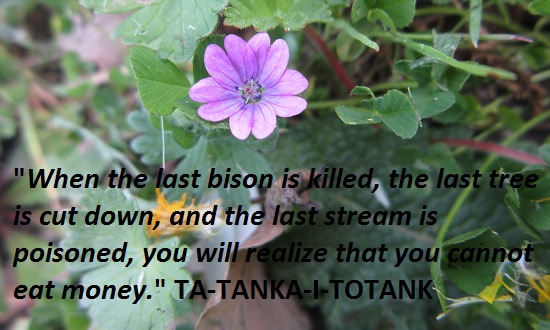old videos – da caricare
A certain job is performed every day by the media. They suggest and repeat over and over that for our society economic growth is super important.
In this video we’ll discuss how today’s over-focus on the economic growth goes at the expense of other important topics, like health and the quality of our life, and also why it promotes a food production model which is totally not sustainable.
Before we start, here is your question for today: what do you think is the difference between growth and development, of the economy and in general of the society? And which one do we need more? Pause the video, share your ideas in a comment, and come back to see if you guessed what I’m about to say.
In theory, economy is very simple: it’s a science about the desires of people. How people satisfy their desires in the market, trading their resources with other resources they want more.
In practice, economy has become very complicated over the last century, and now it serves mainly the desires of just a tiny fraction of the world population. This happened for a couple or reasons:
– First, economy has been increasingly confused with finance. The media depict it as a series of complex indexes, graphs, numbers that are very hard to understand fully for the average person
– Second, for long time now there’s been a steady pressure to increase the scale of the economy, and make it bigger and bigger, and global.
So, in the rest of this video we’ll see how these changes are impacting our life, in particular we’ll try to understand what is the relationship between the size of the world economies and the food we find in the grocery stores.
We need to be more competitive, we need to increase the profits, the economy needs to grow. These are ritual formulas pronounced by politicians and CEOs of the big corporations. Formulas that are punctually and… more or less mindlessly broadcasted everywhere by the journalists.
But do they actually make sense?
If the economy grows, does it mean well-being for us?
Let’s think about it, today there’s a real pressure over the citizen shoulders to have a compliant economic profile. To have a good social reputation, you must pay all the rates of the mortgage, have a stable job, have a good score with your credit at the bank, and pay all your bills regularly.
But what happens in the meanwhile is that there are a lot of people that are not compliant with many other aspects of their life, especially their happiness and health, which is where we will concentrate here. For example, could it be that there is not such a tight relationship between having great finances and having great health?
Some statistics definitely say so, as some of the countries with the richest economies in the world are pleagud by health problems related to a poor nutrition, like the united states. These are typically the countries where the market logic is global, particularly the food market logic. In these countries fast food is everywhere, and the farmers, instead of selling their food to people, sell their food to corporations. And what do corporations ask them?
Potatoes and apples that all look the same, like plastic balls, all without a single imperfection or, god forbid, a worm. But there’s definitely no risk that a worm would want to eat one of those globalized apples, as they are so sprayed with chemicals that it wouldn’t even recognize that stuff as food.
Under the rules of a global economy, the farmers must respond to the desires of the corporations rather than to the desires of people, and they are pressed to adopt gmo seeds, and to poison their foods with concoctions of chemicals. The same foods are later additioned with other chemicals and preservatives in the industries where they are processed, and finally wrapped with tons of plastic to be sent somewhere on the other side of the planet.
Of course the situation is not only limited to fruit and vegetables, but also to meat, fish, dairy, everything.
So, what are the first features of the global food that we can notice? First, it is frequently unhealthy. And second, it is definitely not sustainable. The global food has a monstruous fingerprint on the environment. And this is because we do really crazy things.
Why is it that here in Italy, we are the largest kiwi producers in the world, and you go to the grocery store and 99% of the times you find kiwi coming from new zealand? Or that we import canned tomatoes from China, while we produce fresh tasty tomatoes ripened at the sun of Sicily?
The crazy phylosophy of a global economy created a system where foods travel back and forth around the planet, they’re rarely eaten in the same region where they’re produced, and this mechanism is of course very taxing for the environment.
But then there is a third, horrible feature typical of the global food.
The waste. Not only the global food is dangerous for our health, not only it is environmentally not sustainable, it’s is also often produced uselessly. This model of production causes an enormous waste in the food produced, simply because the offer (which is the farmer) and the demand (the person who eats the food) are so distant that they can’t communicate directly.
One produces food for an unknown entity which is somewhere else in the world, without even knowing how that entity likes the food, and how much he needs of it. The famous report that came out last year “global food, waste not, want not” highlighted how up to 30-50% of the food produced in the world never reaches a human stomach. Either because it’s wasted at the origin, for poor production methods in the developing countries, or because it’s wasted at the destination, for the consumistic attitude of the customers in the developed countries.
It’s just crazy. That’s why now we start to talk about something that makes much more sense. Let’s make a comparison with the local food.
Food which is grown in the same area where it’s eaten, that doesn’t need to travel for miles to reach the destination. In this scenario the customer can go directly to the farmer to buy her stuff, she can see how the veggies are grown, she can tell directly to the farmer what products she prefers. It’s obvious that in this case things are much easier, more reasonable, and favor the production of natural foods that require less chemicals, plastic, and resources to be delivered.
How do these local grown foods look like?
Well, real apples, potatoes, and other vegetables that are not impregnated with chemicals are not perfect, and you have to remove the part with the worm sometimes. But this happens because, yes, life sometimes requires us to compete, but it’s not a competition for what country has the biggest economy and the biggest banks, it’s a competition between us and the other life forms to access something which is more important and concrete than pieces of paper: real food.
Food is the most important product men produce. Food is the thing we consume daily. But since food started to respond to the logic of a market dominated by a global economy, it became more fake, it started to make us sick, and it started to make the planet sick.
It’s evident that in recent times we’ve been making things in the exact opposite way as it would make sense. Few food corporations are profiting from this big-global-economy model, and a lot of people are being negatively impacted by it.
Now, this situation is not mandatory, there is not any natural reason why the economy must become enormous. In a planet where the physical resources are finite, it doesn’t make sense to press for an infinite growth. At some point we have to stop. Some errors have been made, and they started when the governments began to under-regulate the global economies and to over-regulate the local economies.
These errors brought us to the paradoxical situation where it’s more convenient to import kiwis from new zealand rather than from the farmer next door. But things can change and corrections can still be made.
We can have our health back, we can stop devouring the biosphere by creating a network of local economies. Economies that are closer to the needs of people, in which the food is produced by the farmer nearby with natural methods. GMOs and chemicals are definitely not a necessity.
And here we get to the initial question: do we need growth or development?
It’s obvious that an endless growth in a planet with finite resources is impossible. And if the resources remain the same, while the economy keeps on increasing its size, the only possible result is that the economy loses contact with the reality. And it becomes just an abstract system built on pieces of paper with no value.
So how do we avoid this situation? How do we avoid the paradox of rich economies sided by unhappiness, bad health, and the series of other problems that we didn’t discuss in this video, since here we’re focusing only specifically on health?
The shift in mindset that we need is to understand that more than growth we need development. That’s what will bring us well-being: developing towards a system which is near people’s needs, where resources are used more effectively for the benefits of many, possibly everybody.
On a final note, before closing this video, I want you to reflect on something. It’s been awhile since we started to give this exxaggerate attention to the economy based on pieces of paper. And since then, we’ve been neglecting not only our health, but a lot of other disciplines, like art, phylosophy, architecture. The ancient civilizations, like Romans, Egyptians, Greeks produced incredible wonders, think to the Coliseum, or the pyramids, with technologies that were ridiculous compared to our present technologies.
And today, we have an enormous potential and what are we producing? What are we leaving as heritage to the future generations? Maybe it’s time to worry less about money and start again to worry about creating beauty! What do you think?


